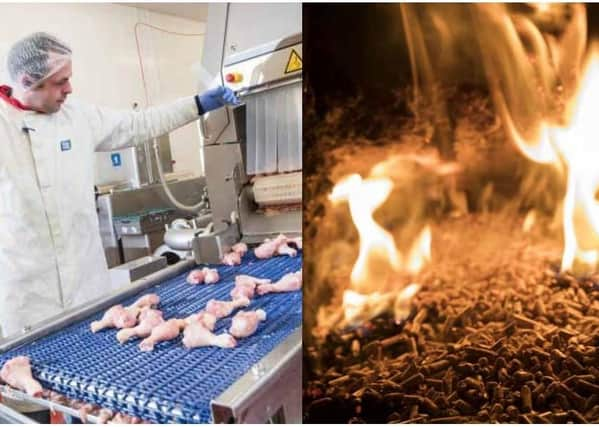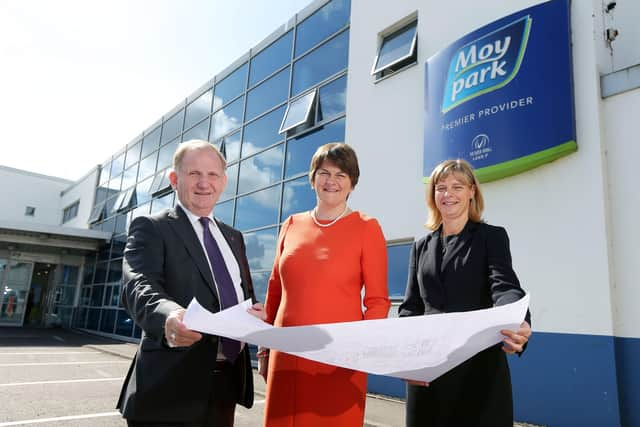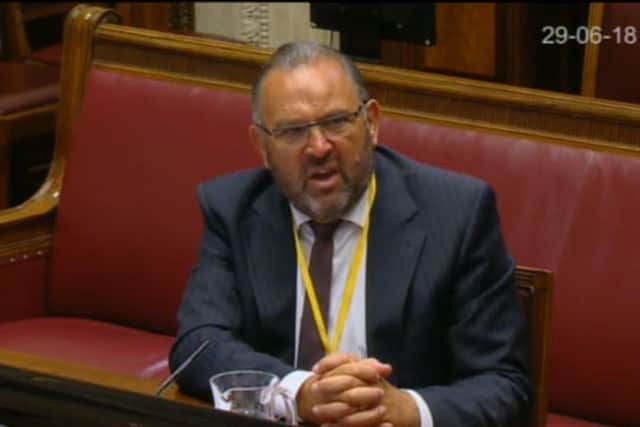Moy Park misled the public over cash for ash – it knew for years that RHI made money for its Brazilian owners


A News Letter analysis of multiple internal Moy Park documents which are among tens of thousands of pages of evidence published by the RHI Inquiry shows that senior company figures identified seven significant ways in which the firm indirectly made money from RHI.
Northern Ireland’s monopoly poultry processor, which has a turnover of £1.6 billion, told BBC Spotlight in 2016 that it “derives no financial benefit from poultry farmers participating in the RHI scheme”.
Advertisement
Hide AdAdvertisement
Hide AdSenior figures have tied themselves in knots, either rejecting or playing down claims that RHI cash helped fuel its massive expansion over recent years, but in other instances accepting that had happened.


However, internal company documents which have only now been released by the RHI Inquiry as part of a vast document dump of evidence, show that not only was the company financially benefiting from RHI in multiple ways, but senior company figures were aware of that.
That seems to explain why the company urged its farmers to enter the 20-year scheme, and why it lobbied to keep RHI open even when the scheme’s budget had been blown to an extent that it was having to be funded by Stormont taking money from other public services.
In one internal email a senior Moy Park manager described the environmental aspects of moving to biomass boilers as “literally ‘window dressing’” which “plays almost no part in the objectives of the project”.
Advertisement
Hide AdAdvertisement
Hide AdMoy Park – which supplies chicken sold by major supermarkets including Tesco, Sainsbury’s and M&S – did not want sections of many of the documents to be released and watermarked it with the word ‘REDACT’, but the inquiry chose to publish much of it with minimal, or no, sections being blacked out.


When Moy Park was asked by the News Letter if it accepted that its denial of having received any indirect financial benefit from RHI was now untenable, the company simply said: “Moy Park’s position has been clearly stated and is in the public domain.”
There is no suggestion that Moy Park was acting illegally, or that it was encouraging abuse of the scheme. And in a capitalist system it would be entirely natural for a company to seek to make as much money as possible.
The company, which supplies 30% of all UK chicken, had four boilers of its own, but its farmers have between them 40% of the boilers on the scheme.
Advertisement
Hide AdAdvertisement
Hide AdOne of those farmers testified that while it appeared to the public that they were making huge sums from RHI, Moy Park’s complex pricing structure meant that much of that money ultimately – in an indirect way – ended up with the company and in the bank accounts of its US parent company Pilgrim’s Pride, which is ultimately owned by vast Brazilian meat packer JBS.
Among tens of thousands of pages of evidence which has now been released by the RHI Inquiry are multiple internal company emails which show that the lucrative RHI payments to its farmers helped it to rapidly expand its business by funding better heating systems for poultry houses.
Moy Park was able to cut the sum which it paid its farmers as an expense for their heat, in the knowledge that most of those farmers were getting the huge RHI payments.
The documents show that Moy Park was alive to the financial potential of RHI from just months after the scheme launched in November 2012 – a far earlier stage than previously thought – and undertook detailed financial analysis before deciding on its strategy.
Advertisement
Hide AdAdvertisement
Hide AdIn a 2013 email just nine months after RHI had been launched, Moy Park’s Group Energy and Resource Manager, John Kennedy, said to senior executive Mike Mullan that a risk assessment on biomass for the company was being prepared.
He went on to set out – and financially quantify – the benefits to Moy Park. Referring to RHI payments for biomass boilers, he said there would be a dry litter benefit to the company of £200,000 a year, a food conversion rate benefit (the animals requiring less feed to put on weight) of £560,000, carbon payment savings of about £45,000 a year, and energy bill savings of £2.5 million a year if the company moved to one model of rolling out RHI (a model it ultimately did not choose).
Mr Kennedy also said there would be intangible benefits to the company of reduced pododermatitis and hock burn – two conditions which can afflict poultry crammed into huge houses where the floor area is damp with their own faeces, something the RHI boilers helped reduce by lowering humidity.
Mr Mullan responded: “Great”. Mr Mullan went on to say that “you will need to show financial models in this”, showing that the company – which is known for its minute attention to financial detail in a sector where margins are slim – was from the outset acutely aware of, and studying closely, the financial implications of what it was doing.
Advertisement
Hide AdAdvertisement
Hide AdThe following year, Mr Kennedy expressed scepticism about going for biomass and suggested sticking with gas-fired heating systems.
In another indication that the company was paying close attention to the costs involved, he said: “It is important to note the farmer will not receive the RHI payments but the capital will be lower. As stated, this requires further analysis to determine the best way forward for Moy Park.”
In the same email to a colleague, he said bluntly: “It strikes me that the decarbonisation aspect is literally ‘window dressing’ and plays almost no part in the objectives of the project.”
In a November 2013 email to other senior managers – just a year after RHI had been launched – Moy Park’s head of agriculture growth projects, David Mark, made explicit that the company was urgently trying to get its farmers to enter RHI.
Advertisement
Hide AdAdvertisement
Hide AdHe said: “We have to get a flyer out for the next farmers meeting targeted to existing growers to encourage them to actively consider the opportunity to move to renewables NOW. Specially [sic] explaining the 100% AHP [company support] on Hot Water Heating coupled with the RHI on Biomass Boilers”.
Setting out figures, he said that RHI could see the boilers paid off within four years – with RHI payments for another 16 years – and referred to the way the boilers were installed having to be “managed so as not to loose [sic] RHI”.
In an April 2014 email to Moy Park manager Paul Longstaff, Mr Mark referred to a project which the company was considering and said: “The ability of Moy Park to leverage the RHI on this model is for me a significant factor to make this very attractive”.
Two days before Christmas 2015, and just a month after the end of the spike – much of it from Moy Park’s farmers – which had crippled the scheme before the ‘cash for ash’ tariff was ended, the company’s director of agriculture, David Gibson, emailed Moy Park’s key RHI figure, David Mark, to relay information he had received from a source which he did not disclose.
Advertisement
Hide AdAdvertisement
Hide AdHe said that the RHI scheme would be made even less lucrative within three months and that the budget was moving to Stormont. Five days earlier Arlene Foster’s spad, Andrew Crawford – who the inquiry noted was very close to the firm and would go on to alert it to looming closure – had been told that Stormont was going to have to pay for the entirety of the overspend.
Mr Gibson said that question of whether to implement an “aggressive reduction” in tariffs was “a political decision not yet made” and added bluntly: “Our view is go for as much as you can before March”.
David Mark said at the inquiry that his “prime motivation” in trying to rush poultry farmers into RHI before the cash for ash tariffs were stopped was not to benefit the multinational company for which he worked, but to help the farmers.
After the scheme had closed and as the company considered how to respond to questions from BBC Spotlight in November 2016, Mr Mark gave an insight into the gargantuan sums involved. In an email to Moy Park’s PR advisers, he said that he believed Moy Park’s farmers were in line to receive “rough income over 20 years [of] c£500 million”. That has now been slashed because of the cuts to RHI tariffs.
Advertisement
Hide AdAdvertisement
Hide AdJust before the RHI scandal erupted in December 2016, Moy Park privately told Stormont that RHI was “of immense value” to it, according to a note of a meeting.
In a Department of Agriculture document in February 2017, Ruth Galwey, the then private secretary to DUP Agriculture Minister Michelle McIlveen, referred to a comment at the minister’s meeting with Moy Park five months earlier.
She said: “In relation to RHI Moy Park representatives expressed support for the scheme, saying it was of immense value. They were keen to see a continuation of the scheme as the scheme in GB was still available and this created a disadvantage for [poultry] growers in Northern Ireland. They recognised that the scheme benefits were a reduction in antibiotic use, a good quality environment to grow birds, and a reduction in campylobacter”.
The RHI Inquiry did not criticise Moy Park or other companies which had taken advantage of the riches on offer, saying that “it would have been unrealistic to expect the commercial market to act altruistically in relation to a commercially attractive scheme such as the NI RHI.”
Advertisement
Hide AdAdvertisement
Hide AdA spokesperson for Moy Park said: “Having participated fully with the inquiry process, we welcomed the publication of its report in March which found no fault with the company’s use of the RHI scheme. Its findings and recommendations were not directed towards the business.”
*** For more revelations from the Moy Park files, see Monday’s News Letter.
——— ———
A message from the Editor:
Thank you for reading this story on our website. While I have your attention, I also have an important request to make of you.
With the coronavirus lockdown having a major impact on many of our advertisers - and consequently the revenue we receive - we are more reliant than ever on you taking out a digital subscription.
Advertisement
Hide AdAdvertisement
Hide AdSubscribe to newsletter.co.uk and enjoy unlimited access to the best Northern Ireland and UK news and information online and on our app. With a digital subscription, you can read more than 5 articles, see fewer ads, enjoy faster load times, and get access to exclusive newsletters and content. Visit https://www.newsletter.co.uk/subscriptions now to sign up.
Our journalism costs money and we rely on advertising, print and digital revenues to help to support them. By supporting us, we are able to support you in providing trusted, fact-checked content for this website.
Alistair Bushe
Editor